
The NNAAC Fellowship program is a leadership development training program that has been developed through the National Network for Arab American Communities. The program is designed for Arab American undergraduate juniors or seniors or graduate level college students, or recent graduates. Fellows will be expected to work 16 hours per week in an Arab American […]
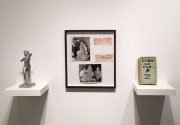
In February, Aicon Gallery opened its doors for Seed for History and Form—Tebhaga, a group exhibition organized by Sumesh Sharma, presenting works by a roster of international artists. The exhibition includes works by Amadou Badiane, Richard Bartholomew, Jyoti Bhatt, Biren De, Haren Das, Aurélien Froment, Laxma Goud, Somnath Hore, M. F. Husain, Mohammad Omar Khalil, Rachid […]

Institutional leaders say such restrictions would have grave consequences on exhibitions, research and the future of cultural exchange Artists, curators and leaders of top US museums are anxiously awaiting President Trump’s revised executive order on immigration—and they are prepared to vigorously protest against the new administration’s isolationist policies. The latest order, which was being […]
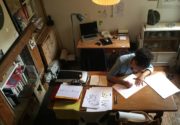
Dia Batal has developed a multidisciplinary approach, creating context specific work, mostly designed for physical interaction. This style harmoniously brings the art of calligraphy, the functionality of design and the meaning of words with the use and form of the Arabic language.
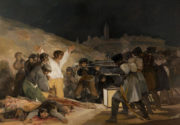
“Arguably, the exponential proliferation of still and moving images has relentlessly pushed against the boundaries of what is deemed provocative, untenable, unacceptable. Today, the global mainstream audience seems numbed with regards to the pain of others and the abominations of war. The filmed (and suspiciously, meticulously art directed) execution videos produced by ISIS are a […]
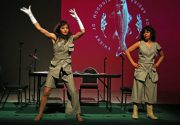
"Its strengths are verbal and vocal. Even through the distortion of heavy reverb, the four women (Mona Gamil, Alaa Abdellateef, Salma Abdel Salam and Charlene Ibrahim) do pitch-perfect imitations of politicians and diplomats. In its parody of political speech, the script can be clever, with multi-sided ironies. The globe-spanning imperial titles of the new world order (“Her Majesty the Queen of Liberia and the American West Coast”) sound as absurd, and dangerous, as those of the old. The names of participants in a “cabaret for the colonies” scroll in an amusing list: Scarlett O’Sahara, Guantánamo Babe."
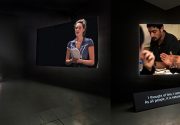
"It was quite a challenge to bring together a study of these places that are so complex so I wanted to be driven by ideas as my organizing principle," she said, “I didn't go country by country…. With the exception of Iran and Turkey, all of the countries featured here have gone through some form of colonial treatment in recent centuries so that is an important theme." The exhibition explores narratives of origin, ideologies of architecture and—most timely—the politics of migration."
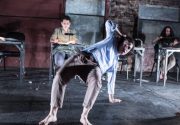
"Zig Zig opens with five women sitting behind desks in a row at the back of the stage. One plays the violin, another reads an archival document that sets the scene, and the others mime leafing through documents. I liked this set-up. They move around and return to the desks, combining dance, song and acting. Each play different roles at different moments, reading from the archives, reflecting on them, acting as the military, the native prosecution or the women themselves giving testimony and answering harsh questions in the British military court."

“I don’t really understand what ambition means. I take things one piece at a time. I’m excited about working on something, that’s all. I didn’t know what was going to happen next, and I still don’t. I don’t know if I think in terms of a career. I don’t have a strategy. It’s just the next show. I used to say to my father: ‘I’m lucky: I got this, or that.’ And he would say: ‘No, no, you deserve it. You’ve been working hard.’ But I was determined: ‘No, it’s all luck.’ I feel things happen accidentally.”
An administrative court has annulled a ministerial decision to grant powers of arrest to the musicians and actors syndicates, according to the Egyptian Center for Economic and Social Rights (ECESR). Last September, then-Minister of Justice Ahmed al-Zend issued a decree granting six council members of the Actors Syndicate – including the syndicate’s president and secretary general – judicial police powers, to be used in instances where the laws regulating the syndicate, its memberships or artistic production have been violated.